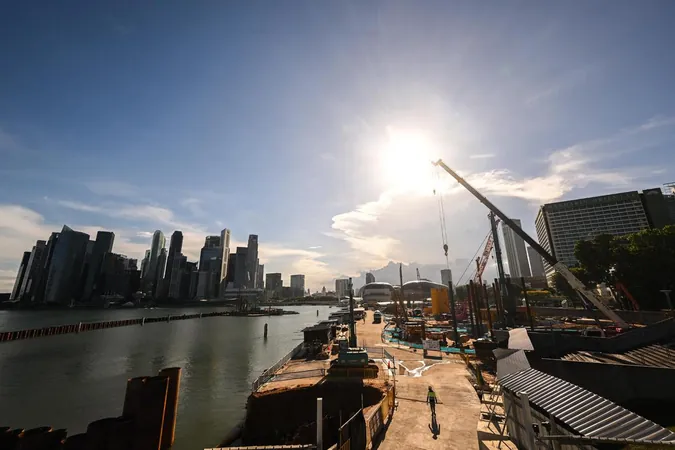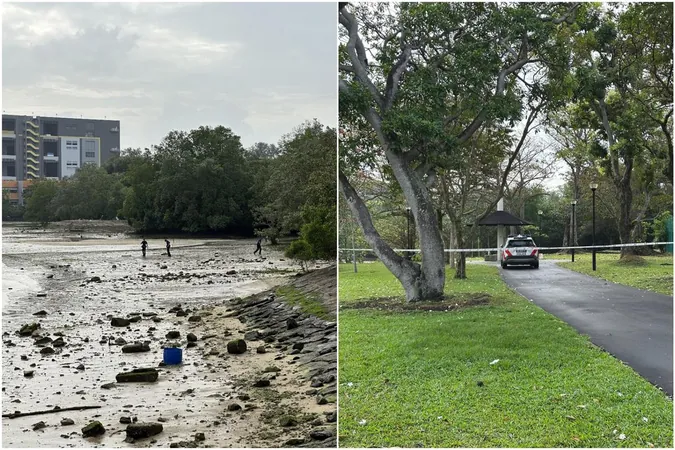
Singapore Unveils Comprehensive Plan to Combat Heatwaves: What You Need to Know!
2025-03-20
Author: Ming
Introduction
Singapore is stepping up its game with a new national plan aimed at helping residents cope with the increasing threat of heatwaves. As temperatures rise, the government is set to roll out designated cooling spaces across the nation where individuals can seek relief from the sweltering heat.
Cooling Spaces Initiative
These cooling spaces, some of which will be air-conditioned, will be available in various community centers and select Residents’ Networks, particularly around one- and two-room HDB blocks. Air-conditioned indoor sports halls will also serve as refuges for those looking to escape the heat.
Formation of the Mercury Taskforce
The initiative, announced on March 19, 2023, is spearheaded by the Mercury Taskforce, a collaborative effort involving over 30 governmental agencies and ministries, including the Ministry of Health and the Ministry of Social and Family Development. This task force was formed in response to rising temperatures and aims to create a unified front against heat-related challenges.
Protection for Vulnerable Workers
In response to the heat, existing measures are already in place to protect vulnerable workers—particularly those in labor-intensive jobs—by ensuring they are given adequate breaks in shaded areas to prevent heat-related illnesses. During periods of high heat stress, which are gauged using the wet bulb globe temperature (WBGT) index, workers are advised to take at least 15 minutes of rest for every hour of strenuous work.
Heatwave Definition and Advisory System
The heat response plan establishes a comprehensive strategy for various sectors on how to react when a heatwave is forecasted. While there is no fixed definition of a heatwave worldwide, Singapore identifies one when the highest daily temperature surpasses 35°C over a three-day period, with an average temperature of at least 29°C.
When the Meteorological Service Singapore (MSS) predicts a heatwave, a joint media advisory will be issued to inform the public of the expected high temperatures. During such advisories, citizens are encouraged to limit outdoor physical activities, especially from 11 AM to 4 PM, when heat stress is at its peak.
Adjustments in Educational Institutions
Educational institutions are also making adjustments; preschools and schools are advised to curtail outdoor activities and allow students to wear lighter, more breathable clothing to help them cope with the heat. Notably, Beatty Secondary School has introduced a second uniform made from moisture-wicking materials to keep students cooler during the hottest parts of the day.
Tips for Staying Cool at Home
The task force has also shared tips for residents at home to stay cool, such as taking cold showers, using cool towels, and avoiding heat-emitting appliances. It's vital to create a cool area in the home that is shaded and well-ventilated to combat rising indoor temperatures.
Conclusion
This initiative comes as Singapore braces for its hottest months of the year, which usually span from March to May. Just last year, the country recorded its highest-ever temperature of 37°C in Ang Mo Kio on May 13, 2023, and 2024 has already proven to be one of the hottest years on record.
Historically, Singapore has faced six heatwave incidents, with the last occurring in 2016. However, according to the task force, the conditions this year are not conducive to another heatwave, as the country is currently experiencing La Niña conditions, which tend to bring cooler and wetter weather.
While periods of high heat stress can occur at any time, hospitals in Singapore reported an influx of 71 to 124 admissions for heat-related illnesses annually from 2010 to 2020. Efforts are underway to enhance the measurement of heat stress, including plans to install eight additional WBGT stations across the island by mid-2025.
As we navigate the challenges of extreme heat, experts emphasize the importance of a structured response plan. “Coordinating our efforts not only optimizes resources but ensures the safety and well-being of everyone,” stated Associate Professor Jason Lee of the NUS Yong Loo Lin School of Medicine.
The message is clear: Singapore is equipping itself with a robust strategy to tackle the realities of climate change and heat, ensuring that vulnerable populations are cared for and that everyone remains informed and prepared. Stay cool, Singapore!



 Brasil (PT)
Brasil (PT)
 Canada (EN)
Canada (EN)
 Chile (ES)
Chile (ES)
 Česko (CS)
Česko (CS)
 대한민국 (KO)
대한민국 (KO)
 España (ES)
España (ES)
 France (FR)
France (FR)
 Hong Kong (EN)
Hong Kong (EN)
 Italia (IT)
Italia (IT)
 日本 (JA)
日本 (JA)
 Magyarország (HU)
Magyarország (HU)
 Norge (NO)
Norge (NO)
 Polska (PL)
Polska (PL)
 Schweiz (DE)
Schweiz (DE)
 Singapore (EN)
Singapore (EN)
 Sverige (SV)
Sverige (SV)
 Suomi (FI)
Suomi (FI)
 Türkiye (TR)
Türkiye (TR)
 الإمارات العربية المتحدة (AR)
الإمارات العربية المتحدة (AR)